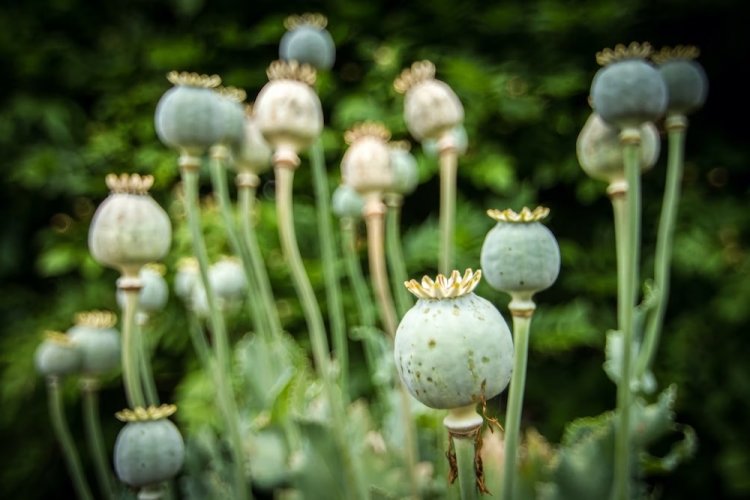The Opium Trade in Afghanistan: A Shocking Reality
Unveil the shocking truth of Afghanistan's opium trade: A tale of addiction, poverty, and geopolitical influence. Explore the human cost, Taliban control, and intricate international connections.

The Opium Trade in Afghanistan: A Shocking Reality
Introduction
-
Introduction to the opium poppy fields in Afghanistan
-
The shocking extent of opium production in the country
-
The connection between Afghanistan and heroin addiction in Australia
-
The lack of shame and embarrassment surrounding opium production
The opium trade in Afghanistan is a surprising truth that still exists despite the presence of many American troops. Afghanistan produces most of the world's heroin—more than three-quarters. This means that it is the largest supplier in the world. The huge fields of opium poppies are truly incredible to behold. They cover thousands of hectares. These fields bring in a lot of money for the war-torn country. They make up half of all the money the country earns.
The link between Afghanistan and global heroin addiction is disturbing. It is estimated that most people around the world either know someone who is addicted to heroin or know someone who knows someone who is addicted to heroin. The fields in Afghanistan provide the material for the heroin that addicts in Australia consume.
The most amazing thing about opium production in Afghanistan is that people are not ashamed or embarrassed by it. Although the production of opium is against the law, many people know about it, and it seems as if everyone is involved. The poor state of the country is a major reason why people produce opium to survive.
The Geography of Opium Production
The opium poppy fields in Kandahar are very beautiful to look at. They extend over a large area of thousands of hectares. The sight is incredible and frightening at the same time. These fields are an important source of money for Afghanistan, as they account for half of the money the country receives.
The opium fields are close to the main highway to Pakistan, which facilitates the illegal drug trade. Trucks can easily transport the collected opium to different regions of the country and to nearby countries such as Iran and Pakistan.
The situation is made even more confusing by the presence of foreign troops, especially thousands of American troops, in Afghanistan. It is confusing to see illegal drugs being produced right under the noses of the troops, who claim they are fighting a war against terrorism and not drugs.
The opium production near the American base is very surprising. The scene is strange and funny, with fields of opium poppies on one side and fields of irrigated wheat on the other. It is difficult to understand that opium is collected in large quantities and is very close to the American base.
From Taliban Suppression to American Invasion
When the Taliban were in power, they succeeded in stopping opium production in Afghanistan. The Taliban were serious and severely restricted opium cultivation.
However, after the invasion of the United States, opium production increased rapidly again. In 2004, opium poppies were grown in every province of Afghanistan—a big change from the time when the Taliban were in power.
Opium poppy cultivation is now widespread throughout the country, and the fields cover a large area. There are various reasons for the increase in production, such as the problems caused by the American invasion and the lack of effective measures to stop drug trafficking.
It is surprising to see how many provinces grow poppies. Opium is grown in every province, which shows that the problem is big and that it is difficult to stop production.
To understand how the opium poppy grows, we can think of it like normal gardening. Afghan farmers grow opium poppy in their fields, similar to how people grow flowers or vegetables in their gardens. But this seemingly harmless thing has major implications, as it exacerbates the global opium trade and contributes to the serious problem of heroin addiction.
The Process of Opium Production
Opium production begins with the planting of poppy seeds in large fields in Afghanistan. These fields cover a large area and are an important way for the country to earn money. The opium poppy fields are really impressive and beautiful, but their large-scale production is also quite scary.
After the poppy has grown, the next step is to extract the opium from the seed pods. Extracting opium is actually quite simple. All you need is a tool with six small needle points at one end. The farmers scrape off the ripe seed pods in the evening, which releases a milky liquid. They then leave the pods overnight to thicken. They return the next morning and use the same tool to remove the opium.
We spoke to a farmer in Afghanistan to find out more about the next step in the process. The person who grows opium said that after opium is removed, he usually sells it to another person who converts it into heroin. The person who grows plants said that he secretly brought a small amount of opium to Iran. In Iran, the opium is then converted into strong heroin.
After that, the process of converting poppy into heroin continues. The drug heroin is often shipped to other countries, such as Australia, where it contributes to the serious problem of heroin addiction. The raw material for the heroin that addicts around the world inject often comes from the opium fields of Afghanistan.
In general, the production of opium is a complicated and far-reaching process. It involves various steps, such as the cultivation of poppies, the extraction of opium, and the conversion of opium into heroin. The opium trade in Afghanistan is still a very bad thing, and the fact that the people involved are not ashamed of it makes it bigger and bigger.
The Economic Impact and Corruption
The opium trade in Afghanistan has a major impact on the country's economy. Half of the money it earns comes from opium production. The large opium poppy fields cover many hectares and bring in a lot of money for the war-torn country.
The opium trade has a surprising price differential compared to other crops, such as wheat. Wheat can be sold for as little as 20 cents per kilogram, while opium poppy can sell for prices between 250 and 350 dollars per kilogram. The large price difference makes opium cultivation a good choice for Afghan farmers who want to earn a lot of money.
The opium trade influences the money market in Kabul. Rich traders in Kabul use cash for their transactions. Opium production and the sale of heroin make up a large part of the Afghan economy and contribute about half of the country's national income. However, it is important to note that these activities are illegal. The opium trade keeps the money market going and makes traffickers rich.
Corruption is closely linked to opium production in Afghanistan. There is evidence that corruption exists at the highest levels and that provincial governors and even national-level politicians are involved in the trade. The powerful are tempted to get involved in the illegal opium business because it can be very profitable. The level of corruption shows how difficult it is to stop opium production and how important it is to have good anti-drug methods.
Corruption and opium production are linked, which contributes to the illicit trade continuing to grow. It creates a cycle where those responsible profit from the trade, making it hard to get rid of. Opium production is a big problem because there is not enough enforcement and accountability. This makes it difficult for foreign troops and law enforcement agencies to stop the trade.
American Troops and the Opium Dilemma
The American troops in Afghanistan are very important for the security and stability of the country. These soldiers are mainly focused on fighting terrorism and helping the Afghan government maintain peace and control. But their presence also draws people's attention to the problem of opium production in the country.
It is strange that the American soldiers, who claim to be fighting a war on terror, do nothing about the opium that is grown in large poppy fields. These large fields, which cover thousands of hectares, are an important source of income for Afghanistan. They account for half of the country's total income. The soldiers who have seen this spectacle without doing anything make people doubt their mission to stop the opium business.
The reason they are not stopping replanting is that it may not be practical or effective to do so. If soldiers destroyed the opium poppy fields, farmers would simply replant them. People in Afghanistan grow opium because they are poor and the country is not stable. They do it to survive. If you worsen their living conditions without giving them other options, their situation will only get worse.
To solve the opium problem, we need the help of the Afghan authorities. They must make it their mission to stop opium production and introduce effective methods to combat drugs. The Afghan Drug Enforcement Police and other law enforcement agencies are very important in stopping the growth of poppy plants and catching people involved in the illegal drug business.
However, the problem of corruption in the Afghan authorities is a major challenge. There is evidence that high-ranking officials, including provincial governors and national politicians, are involved in the opium trade, which is a form of corruption. Those in charge are tempted to do illegal things because they can make a lot of money from this business. This allows the opium trade to continue to grow.
To stop opium production, we need to use different methods. It is important to help Afghan farmers who grow opium find other ways to earn a living. This will help solve the problems of poverty and instability in Afghanistan. It is also important to work with other countries to support the Afghan government in combating the opium trade. This includes providing the necessary resources, training, and information sharing to effectively tackle the problem.
Efforts to Eliminate Opium Production
The Drug Enforcement Agency of Afghanistan is very important to stop opium production in the country. Their main goal is to destroy the poppy plants that produce opium. But the way they destroy the plants is different.
Instead of burning or spraying the fields, the Drug Enforcement Agency uses plows to bury the plants in the ground. This method is intended to physically destroy the poppy plants so that they can no longer grow and be harvested.
Although this method seems to be effective in theory, it has little effect because corruption is widespread. Many local governors and even politicians from all over the country are involved in opium production. Corruption at the highest levels makes it difficult for the Drug Enforcement Agency to do its job and contributes to the growth of the opium trade.
Furthermore, when provincial governors are involved in opium production, it creates a difficult situation. These governors have a lot of power and influence in their provinces. This makes it difficult to ensure that people stop producing drugs and get rid of opium.
The money they can make from the opium business entices people into positions of power. This tempts them to do illegal things, which further increases the opium trade. The corruption makes it difficult to stop opium production and is a major problem for foreign troops and the police.
The Fragile State of Afghanistan
The opium trade in Afghanistan has created a fragile state, with significant consequences and challenges for the country. Here are some key points to consider:
-
The consequences of stamping out opium production
-
The dependence of the economy on the opium trade
-
Limited progress in Kabul compared to the rest of the country
-
The threat of falling back into anarchy without international support
Stopping opium production in Afghanistan would cause major problems for the country. Opium is a big part of the money in Afghanistan. It provides them with a lot of income. If we stopped opium production, the economy would be very bad. It would make a lot of people poor, and the situation would be unstable.
Afghanistan's economy is heavily dependent on the opium trade. Half of the country's national income comes from opium production. Afghan farmers find opium production attractive because they can earn more money from it than from other crops such as wheat, as prices vary greatly.
The situation in the capital, Kabul, has improved somewhat. However, the warlords and the Taliban still control most of the country, which is not developing very well. The presence of foreign troops, including many American soldiers, makes people wonder what they are doing to stop the opium trade. When they see illegal drugs being produced right in front of them, it weakens their argument that they are fighting a war against terrorism and not against drugs.
If Afghanistan does not receive help from other countries, there is a danger that the country will sink back into chaos and disorder. The country has been at war and in conflict for many years. Without help from other countries, it would be hard to keep things safe and stable. American troops are very important, but to solve the opium problem, we need the help of the Afghan authorities and effective methods to stop drug trafficking.
To summarise, the opium trade has made Afghanistan a weak and unstable country. Stopping opium production would harm the economy. The country is dependent on the opium trade, which makes it difficult to develop and remain secure. If Afghanistan does not receive help from other countries and does not take strong measures, there is a risk that the country will fall back into chaos.
The Future of Afghanistan
Afghanistan has been through many battles and wars for a long time. The country is still fighting terrorism and rebellion. The country has had many problems remaining stable and secure, and we don't know what will happen in the future.
Afghanistan relies on American troops to maintain its current stability. The presence of these troops is very important to keep the peace and ensure that militant groups do not return. However, relying too much on foreign troops raises the question of whether Afghanistan can remain stable in the long term.
A major concern for the future of Afghanistan is the danger of the Taliban taking control again. The previous government had effectively controlled the Taliban, who were notorious for their harsh rule and support of terrorism. But when America invaded, they regained influence, and there is still a big risk that they could come back to power, which is a serious threat.
Success in Afghanistan is difficult and unpredictable. The country has many problems, such as a lot of corruption, poverty, and not enough good ways to stop drugs. It is not clear how long it will take to achieve stability and stop opium production, and progress in reducing the opium trade is slow.
To stop opium production and address the root causes of the problems, we need to use other methods. It is important to provide farmers who grow opium with other ways to earn a living. We also need to address the main problems of poverty and corruption. Countries around the world must help Afghanistan by providing resources, training, and sharing information.



 admin
admin 










